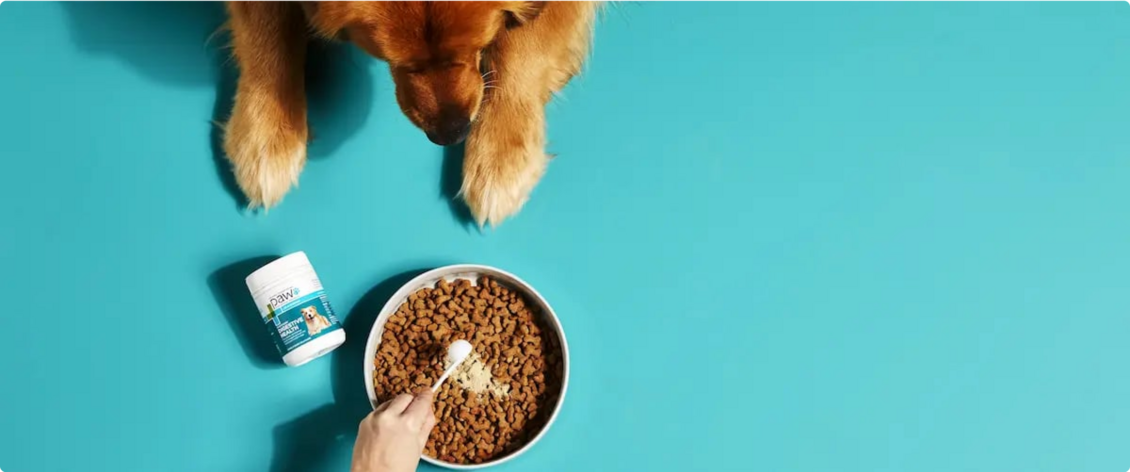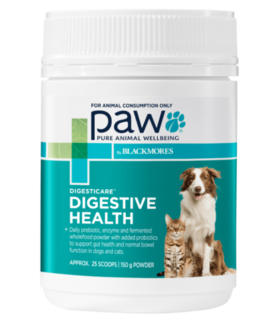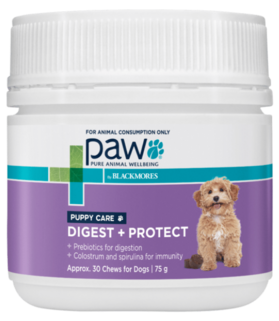Last Updated: 07/05/2025
How to Improve Your Dog's Gut Health Diagnosis and Treatment
A dog's gut health has long term effects on their overall well-being. Learn about the gut microbiome signs of gut health issues and how to address these.
Author: Dr Michelle Wong BVSc
Reading Time: 5 minutes - short read
Do you want to restore your dog's gut health? Placing an emphasis on your dog's digestive health can have positive impacts on their long-term wellbeing.
Learn about gut microbiome, signs of gut health issues and how to address these from our Pet Circle vet Dr Michelle Wong.
What are the essential characteristics of a healthy gut in dogs?
A healthy gastrointestinal tract is reliant on the balance of the organisms within your dog's gut. You may have heard of the term gut microbiome or microflora and wondered what this actually means. Gut microbiome, microbiota or microflora refers to the bacteria living inside your dog's intestinal tract, which play an important role in healthy digestion.
When there is an abundance of healthy gut bacteria, the nutrients from food are more readily absorbed which helps your dog to have an ideal body condition, healthy skin and coat, optimal immune system, and normal stool production.

What happens when your dog has an unhealthy gut?
Without the beneficial gut microflora, your dog will often develop diarrhoea due to an imbalanced microbiome. The intestinal tract is unable to digest food properly, and there is a loss of nutrients, electrolytes and fluids from their body. Many essential vitamins and minerals, such as vitamin E, require dietary absorption and any impairments can lead to deficiencies, causing abnormal bodily function and illness.
An imbalance and upset of the intestinal tract can also lead to disruption of your dog's overall wellbeing. Their immune system can be affected as they are unable to absorb nutrients and the inflammation of intestinal walls creates ongoing digestive troubles.
Gastrointestinal problems are the most common ailments to cause gut dysbiosis, or an imbalance of the microbiome in dogs. Antibiotic treatment may also cause issues as they can reduce the numbers of good bacteria in your dog's gut.
Noticing gut issues in your dog early on can help us tackle the problem more quickly and easily. The solution is often simple, such as upgrading your dog to a premium diet, and providing support for their gut microbiome, like giving them a probiotic supplementation such as PAW by Blackmores DigestiCare which helps to maintain and restore a healthy and happy gut.

Signs of Gut Health Issues and Solutions
Diarrhoea
Diarrhoea is a common symptom of a number of gastrointestinal issues in dogs, characterised by loose, watery, and often smelly stools. The main causes for your dog's diarrhoea include: a change of diet, eating something they aren't supposed to, dietary intolerances, stress, infectious causes, and underlying medical conditions.
Solution: Probiotic supplementation is essentially depositing beneficial live microorganisms directly into the gut. It is particularly helpful in supporting dogs with chronically sensitive stomachs. Feeding a premium diet is also beneficial. Premium brands understand the importance of gut health and will include ingredients in their diets to support this. These may be probiotics or beneficial plant fibres (prebiotics) which act as 'food' to promote growth of good gut bacteria.
Optimal gut health is important for all life stages. The PAW by Blackmores digestive health range will ensure the well-being of your adult dog and support your puppy's needs to thrive and grow. These include an optimal mix of prebiotics, along with probiotics in the case of PAW DigestiCare, which help to establish healthy gut microflora, and can also be used in the management of diarrhoea.

PAW Blackmores DigestiCare is a probiotic and wholefood powder for the maintenance of everyday digestive health in dogs and cats.

PAW by Blackmores have designed their first supplement for puppies to support the healthy development of the digestive and immune system.
Vomiting
When your dog vomits, they expel partially digested food and bile from the stomach. The top causes of vomiting include dietary indiscretion, a change in diet, toxicity, intestinal obstruction, infections and organ-related disease.
Solution: Different treatment methods are required, depending on the underlying cause. The first step would be to identify what could be the issue and when to see your vet. When introducing your dog to a new diet, be sure to do a gradual transition to reduce stomach upsets. Premium diets use quality ingredients and are less likely to cause gastrointestinal problems. If your dog has continuous vomiting and is unable to drink or eat, do not delay veterinary attention and treatment.
Flatulence
Stinky farts can clear out a room very quickly, and nobody wants to sit near a dog with a pungent aroma. Flatulence could be caused by the wrong diet, an unbalanced gut microflora, or gastrointestinal illness.
Solution: Feed a good quality diet that contains adequate fibres and is easily digested. Support a healthy gut with probiotics - your pet will thank you for it. A balanced microbiome will help fight off infection, improve digestion and boost immunity.
Poor Skin and Coat
Skin and coat troubles in your dog could be attributed to multiple factors, whether it's an improper diet leading to deficiencies, inadequate grooming routine and products, or underlying allergies. Unhealthy microflora in the intestines can create inflammation in the body and present symptoms such as skin irritation and itching.
Solution: Fish oil, like PAW by Blackmores Fish Oil 500 Veterinary Strength, and vitamin E supplements, along with moisturising shampoos, like PAW by Blackmores NutriDerm Replenishing Shampoo, may help improve the skin and coat. Probiotics can enhance the immune system which may reduce the risk for skin infections, and can also help with improving allergy symptoms.
Bad Breath
Just as microflora exists in the gut, they are also present in the oral cavity. Imbalances with the microbial environment in the mouth can cause bad breath.
Solution: Practising a good oral care routine with your dog includes regular toothbrushing, giving dental treats and other oral products to reduce plaque and tartar buildup. It's important to support healthy gums and teeth so cultivate a healthy oral microbiome to prevent bad breath and dental disease.

Not sure where to start?
If your dog has pre-existing conditions and you are unsure where to begin, or which gut health plan would be suitable, always seek professional guidance. Your veterinarian will be the best source for advice and personalised recommendations to accommodate your dog's individual needs, or you can chat to our Pet Circle Vet Squad between 6am and 10pm, 7 days a week for free general digestive advice.
Further Reading
Want to know more? Check out our Discover Page for more tips on keeping your pets happy and healthy.